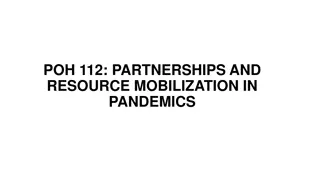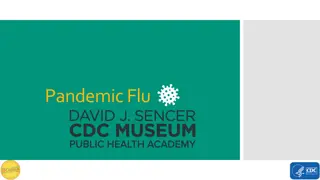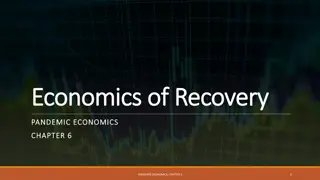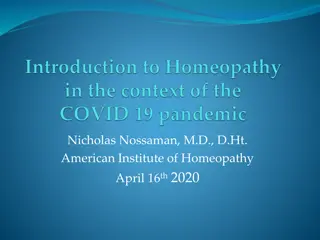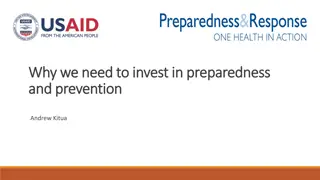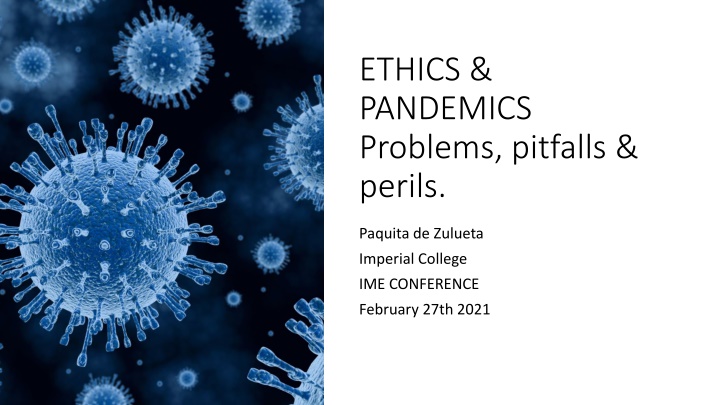
Exploring Ethical Challenges During Pandemics: Reflections and Perspectives
Delve into the ethical challenges posed by the COVID-19 pandemic, ranging from collective grief to the impact on medical students. Discover different ethical frameworks, the multi-layered perspective, and the role of medical ethics in guiding actions and justifications in healthcare relationships.
Download Presentation

Please find below an Image/Link to download the presentation.
The content on the website is provided AS IS for your information and personal use only. It may not be sold, licensed, or shared on other websites without obtaining consent from the author. If you encounter any issues during the download, it is possible that the publisher has removed the file from their server.
You are allowed to download the files provided on this website for personal or commercial use, subject to the condition that they are used lawfully. All files are the property of their respective owners.
The content on the website is provided AS IS for your information and personal use only. It may not be sold, licensed, or shared on other websites without obtaining consent from the author.
E N D
Presentation Transcript
ETHICS & PANDEMICS Problems, pitfalls & perils. Paquita de Zulueta Imperial College IME CONFERENCE February 27th 2021
Collective grief. Massive loss of life UK: 135,600+ and rising (ONS figures). Livelihoods destroyed. The arts - Cultural apocalypse? Relationships torn apart, or aborted. Loss of touch Increased Ioneliness Mental health tsunami ? Education severely disrupted Socio-economic inequalities exposed and deepened within and between nations. Syndemic not pandemic. Loss of civil liberties. Human rights under attack. The overwhelming nature of the COVID19 pandemic
What ethical challenges have you encountered directly or indirectly in relation to the pandemic?
Medical Students Medical Students One survey in USA: many students reported feeling distressed watching patients isolated from loved ones, or anxious about being safe or competent, or feeling distant because of PPE. Similar stories expressed by students at Imperial Schwartz rounds. But also sense of pride and competence when they could genuinely help and be part of a team. Students and trainees have experienced considerable loss loss of routines and traditions, expertise, educational opportunities and social connections - and many are witnessing loss of life. [Gallagher & Schleyer 2020]
TOPICS TO EXPLORE What ethical frameworks or lenses work best in a pandemic? Issues around autonomy, consent and confidentiality The right to public health Some issues around Justice
A Multi-Layered Ethical Perspective INDIVIDUAL FAMILY & COMMUNITY PUBLIC HEALTH GLOBAL ENVIRONMENT & INTERGENERATIONAL POLICIES & POLITICAL LEADERSHIP
ETHICAL LENSES
So where does medical So where does medical ethics fit? ethics fit? Two primary functions Two primary functions: Clear action guidance Clear action justification [Lewis & Schucklenk, Bioethics 2021] At its core much of medical ethics is about relationships and what we owe each other in the healthcare context.
The need for an ethical Road Map In planning our way through this pandemic we need to follow the ethics, not just the science. [Fritz et al. 2020] 1. Call for a nationally led and coordinated development of publicly shared ethical guidance for clear, consistent and defensible decisions in all healthcare and policy settings. 2. Ethics support structures coordinated, resourced and embedded throughout the health and social care systems.
KEY ETHICAL CHALLENGES (PROBLEMS) Ethical challenges for everyone: patients, families, healthcare workers, policy makers and the wider public. These include issues concerning: Resource allocation decisions Addressing inequalities, equity of access Individual autonomy & consent Confidentiality and Privacy issues Scope of duty of care Advance decision making
POTENTIAL CONFLICTS or TENSIONS Respecting individual autonomy or the public good Scope of duty of care (of clinicians) to patients, their families & to the wider community. Achieving just & fair allocation of resources, including vaccines. National vs global interests Ethical challenges in COVID19 pandemic But are all these conflicts real or imagined?
The Problem with the 4 principles approach The Problem with the 4 principles approach and guidelines and guidelines The 4 principles are typically in conflict. How to prioritise? If used for drafting guidelines they cannot ..provide a clear and conclusive answer to the question of who, in the here and now, should be offered treatment or a vaccine when it is not possible to treat or vaccinate all those who could benefit. . .. policymakers cannot presume on the face of guidelines as they are that patients, and the broader public, will, in fact, agree with them . [Lewis and Schuklenk 2021] Sample Footer Text
VIRTUE ETHICS VIRTUE ETHICS What virtues are needed? What virtues are needed? COURAGE & FORTITUDE HONESTY & INTEGRITY COMPASSION & ALTRUISM PRACTICAL WISDOM (PHRONESIS) TEMPERANCE JUSTICE We have seen many of these in action from healthcare workers and members of the lay public. But they need to be supported and nurtured to be sustainable.
The Relevance of Relational Ethics The Relevance of Relational Ethics This pandemic has awoken us to how interconnected we are. The good of the individual cannot be separated from that of the wider community. Responding to the pandemic arguably demands a broader ethical perspective than the 4 principles approach, much used in medical ethics. But harsh utilitarian values ( the greatest good for the greatest number ) can be softened by adopting relational ethical values: Emphasis on solidarity and reciprocity, connectedness, equity, relational autonomy, transparency and trust .[David Jeffrey 2020].
SOLIDARITY SOLIDARITY What we do to assist & benefit others with whom we have a connection. Solidarity involves virtues such as compassion, generosity, altruism and a broad sense of fellow feeling . A test of solidarity is how well we look after our most vulnerable in our populations since the burden of the pandemic will fall on the most disadvantaged groups. Solidarity is linked to social justice and fair access to social goods. Support of healthcare workers essential to solidarity. Solidarity can be eroded if perceived as only for some.
SOLIDARITY & RECIPROCITY SOLIDARITY & RECIPROCITY Public Health relies on people engaging in solidarity. It also requires government to support acts of solidarity by providing clear, unambiguous guidance & rules that people can understand and support, by supporting those who need to take isolation measures, and taking timely and appropriate measures for those who have to put themselves at risk to serve others. Solidarity is for all of us, including those in government. [West-Oram 2020]
Feminist & Communitarian Ethics & Autonomy Critique of individual autonomy: This vision of the autonomous individual as one securely isolated from his threatening fellows seems to me to be a pathology that has profoundly affected western societies for several centuries. [Nedelsky 1989]
RELATIONAL AUTONOMY Relational autonomy involves a change from the individual self to one embedded in social context. The capacity to find one s own law can develop only in the context of relations with others (both intimate and broadly social) that nurture this capacity.
A Personal view from a Bioethicist The notion of people as separate, rational and self-determining beings seems to overlook the connectedness and relationships that shape not only our choices, but also inform what it is to be part of a flourishing community . ... Fundamentally, autonomy is relational. It is not solely intellectual. It is predicated on interaction and exchange. It does not and cannot exist without the kindness, patience, sensitivity, wisdom, honesty, commitment and expertise of professional staff. Professor Deborah Bowman on Autonomy.
PARTICULAR CHALLENGES FOR HEALTHCARE WORKERS PARTICULAR CHALLENGES FOR HEALTHCARE WORKERS Allocation of finite resources Prioritisation of patient care Provision of care with insufficient PPE Necessity of working outside one s area of expertise Preventing relatives from being with their loved ones. Balancing personal and professional obligations with a higher risk of exposure to infection at work. Guilt if unable to work. These emotionally laden challenges may lead to moral distress particularly for those in close contact with patients or who witness extreme suffering. May also lead to fear of litigation or complaints.
MORAL DISTRESS & INJURY MORAL DISTRESS & INJURY The emotional distress that arises from feeling unable to do what one believes is the right thing to do, and/or being in conflict with others on the right course of action. If frequent or prolonged it can lead to burnout, demoralisation, disengagement or even leaving the job. Moral injury goes beyond psychological harm and has a profound existential dimension leading to disruption of a person s moral compass and view of self and the world. Shame and loss of trust, are key features. Multiple episodes of moral distress can lead to moral injury. Prevents people from leading healthy & fulfilling lives.
LACK OF PROTECTION FOR HEALTHCARE WORKERS A recent BMA survey revealed that less than 28% felt sufficiently protected from COVID-19 at work. Clinicians have other duties: to their families, colleagues and wider public. There are limits to how much they should sacrifice their lives or wellbeing in the service of their patients. GMC: We do not expect doctors to leave patients without treatment, but we also don t expect them to provide care without regard to the risks to themselves or others.
CONFIDENTIALITY & PRIVACY Self Isolation and Track and Trace system: The Department of Health and Social Care (DHSC) confirmed details would be shared on a case-by-case basis to give police information on whether an individual has been told to self-isolate. Self isolation is very difficult for those who are not supported financially and/or live in crowded conditions. Insufficiently addressed by UK Government. Informing colleagues/friends worries about stigma, negative impact.
CONSENT Consent means a voluntary, uncoerced, decision, made by a sufficiently competent or autonomous person on the basis of adequate information and deliberation, to accept rather than reject some proposed course of action. [Gillon, 1986] Consent serves many functions: respecting autonomy, establishing trust and facilitating communication.
SPECIFIC EXAMPLES Refusal to be ventilated - How autonomous?
OTHER EXAMPLES Delayed second dose of vaccine: Was valid consent given at the time of the first dose? Negative impact on ICU staff, GP s & their patients. Doctors threatened with license removal if adhered to protocol. OR refusal to be vaccinated? Can this be justified?
JUSTICE & FAIRNESS JUSTICE & FAIRNESS Distributive Justice fair allocation of resources Procedural Justice Openness, transparency, accountability Epistemic (In)justice (Miranda Fricker) testimonial & hermeneutical Intergenerational justice Restorative justice
RESTORATIVE JUSTICE RESTORATIVE JUSTICE Restorative Justice in the context of COVID-19 excess deaths & greater economic hardship disproportionately borne by people from ethnic minorities and those with disabilities (including frail/elderly). Lives lost can never be replaced, yet healing and renewal are possible for those who remain, through acknowledgments of the harm created by centuries of injustice, commitments to rectifying past wrongs, and changes that restore all individuals and communities, but especially those that have lost the most, to a state of health and wholeness. [Cooper & Williams 2020].
The Right to Public Health? The Right to Public Health? A positive case for state action to promote and protect health as a duty owed to each individual. According to this view, the state violates individuals rights if it fails to take cost-effective and proportionate measures to remove health threats from the environment. Too little state intervention in the cause of improving population health can violate individuals rights, just as too much can. [James Wilson, 2016]
What next? Compassion and the Pandemic What next? Compassion and the Pandemic Compassion pushes us to understand how we have structured the world and to ask how we can structure it better, not because we may suffer but because others are suffering, and that is not how the world should be....Surely this moment calls for careful reflection and a reinvestment in compassion as a foundational approach to health [Sandro Galea, 2020].
CONCLUSION The Pandemic or syndemic has broadened our perspective such that we adopt a wider ethical lens, recognising our common humanity, and the broad social, economic and environmental issues that create gross inequalities as well as threaten our collective future. It has made us re-evaluate our values and what really matters to us. In the context of healthcare it has offered new challenges (and old ones), and shown ethics to be integral to the practice of medicine. It encourages us to see health as a public good to be shared in a just and fair way and that we all have a right to public health.
Thank you for listening! Thank you for listening! A Any Questions? ny Questions? p.dezulueta@imperial.ac.uk @PdeZ_doc This Photo by Unknown Author is licensed under CC BY-SA
Selected references Cooper LA, Williams DR. Escess deaths from COVID-19, community bereavement, and restorative justice for communities of color. JAMA 2020;324:1491-2. Fritz Z,Huxtable R, Ives J, Paton A, Slowther AM, Wilkinson D. Ethical road map throught the Covid-19 pandemic. BMJ 2020;369:m2033. Galea S. Compassion in the time of COVID-19. Lancet 2020;395:1897-8. Gallagher TH, Schleyer AM. We signed up for this! Student and trainee responses to the COVID-19 Pandemic. NEJM 2020; 382:25 Jeffrey DI. Relational ethical approaches to the pandemic. JMedEthics 2020; 0:1-4. Lewis J, Schuklenk U. Bioethics met its Waterloo: The doctor knows best again. Bioethics 2021; 35:3-5. Solidarity is for other people: identifying derelictions of solidarity in responses to COVID-19. West-Oram P. JME 2020;0:1-4. Wilson J. The right to public health. JME 2016;42:367-375.





